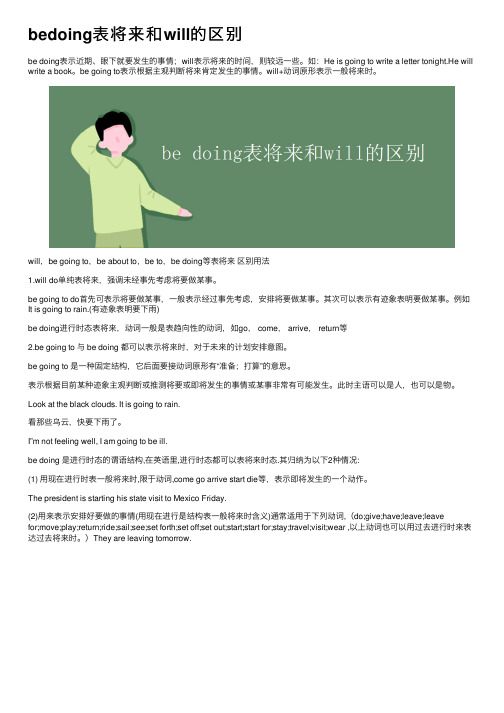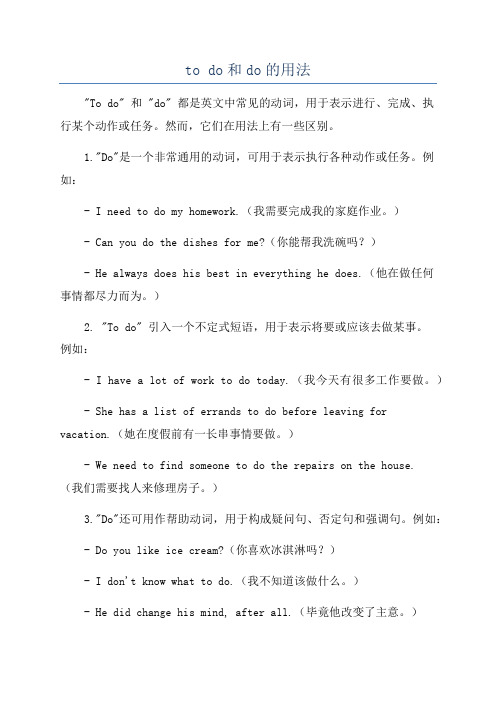将要做某事的几种表达法
bedoing表将来和will的区别

bedoing表将来和will的区别be doing表⽰近期、眼下就要发⽣的事情;will表⽰将来的时间,则较远⼀些。
如:He is going to write a letter tonight.He will write a book。
be going to表⽰根据主观判断将来肯定发⽣的事情。
will+动词原形表⽰⼀般将来时。
will,be going to,be about to,be to,be doing等表将来区别⽤法1.will do单纯表将来,强调未经事先考虑将要做某事。
be going to do⾸先可表⽰将要做某事,⼀般表⽰经过事先考虑,安排将要做某事。
其次可以表⽰有迹象表明要做某事。
例如It is going to rain.(有迹象表明要下⾬)be doing进⾏时态表将来,动词⼀般是表趋向性的动词,如go, come, arrive, return等2.be going to 与 be doing 都可以表⽰将来时,对于未来的计划安排意图。
be going to 是⼀种固定结构,它后⾯要接动词原形有“准备;打算”的意思。
表⽰根据⽬前某种迹象主观判断或推测将要或即将发⽣的事情或某事⾮常有可能发⽣。
此时主语可以是⼈,也可以是物。
Look at the black clouds. It is going to rain.看那些乌云,快要下⾬了。
I”m not feeling well, I am going to be ill.be doing 是进⾏时态的谓语结构,在英语⾥,进⾏时态都可以表将来时态.其归纳为以下2种情况:(1) ⽤现在进⾏时表⼀般将来时,限于动词,come go arrive start die等,表⽰即将发⽣的⼀个动作。
The president is starting his state visit to Mexico Friday.(2)⽤来表⽰安排好要做的事情(⽤现在进⾏是结构表⼀般将来时含义)通常适⽤于下列动词,(do;give;have;leave;leavefor;move;play;return;ride;sail;see;set forth;set off;set out;start;start for;stay;travel;visit;wear ,以上动词也可以⽤过去进⾏时来表达过去将来时。
begoingto句型

汇报人: 日期:
目录
• 定义与概述 • 构成与要素 • 语义与语境 • 形式与变化 • 特殊用法与辨析 • 例句与解析
01
定义与概述
定义
英语中的"be going to"是一种表示将来时态的常用结构,通常用于表达计划或 预期将要发生的事情。
"be going to"中的"be"动词根据主语的人称和时态进行变化,而"going to"则表 示将要进行的动作或事件。
简单动词短语
如go、come、leave等, 表示动作本身。
动词短语加上介词
如go to、come from、 leave for等,表示动作的 方向或来源。
动词短语加上副词
如go away、come here 、leave off等,表示动作 的方式或程度。
宾语
名词
表示动作的对象,如She is going to meet a friend.中的
这个表达通常用于描述未来的计划或意图, 特别是那些已经计划好或安排好的事情。它 强调的是计划和意图,而不是具体的行动过 程。
will do sth
这个表达则更加通用,可以用于表达任何将 来的行动或事件。它没有特定的强调或含义 ,只是表示事情将会发生。
be going to do sth与be doing sth的区别
修饰语
表示动作的状态或性质,如 quickly、happily等。
03
语义与语境
计划和打算
总结词
表达某人计划或打算做某事。
详细描述
当一个人提到他们将要做什么事情时,他们是在表达他们的计划或意图。这种 表达可以是简单的日常活动,也可以是复杂的计划。例如,“我打算明天去购 物”或“我们计划下周举行一个聚会”。
to do和do的用法

to do和do的用法"To do" 和 "do" 都是英文中常见的动词,用于表示进行、完成、执行某个动作或任务。
然而,它们在用法上有一些区别。
1."Do"是一个非常通用的动词,可用于表示执行各种动作或任务。
例如:- I need to do my homework.(我需要完成我的家庭作业。
)- Can you do the dishes for me?(你能帮我洗碗吗?)- He always does his best in everything he does.(他在做任何事情都尽力而为。
)2. "To do" 引入一个不定式短语,用于表示将要或应该去做某事。
例如:- I have a lot of work to do today.(我今天有很多工作要做。
)- She has a list of errands to do before leaving for vacation.(她在度假前有一长串事情要做。
)- We need to find someone to do the repairs on the house.(我们需要找人来修理房子。
)3."Do"还可用作帮助动词,用于构成疑问句、否定句和强调句。
例如:- Do you like ice cream?(你喜欢冰淇淋吗?)- I don't know what to do.(我不知道该做什么。
)- He did change his mind, after all.(毕竟他改变了主意。
)4."Do"还可用作一个泛指的动词,用于表示对待某人或事情的方式。
例如:- How do you do?(你好吗?)- He does everything with care and attention to detail.(他做任何事情都非常细心和注重细节。
will与be going to 的区别

will与be going to 的区别will与be going to 的分别be going to与will两者都可表示将要发生的事、将要去做某事,但它们有如下几点区别:1. be going to 表示将要发生的事情,will 表示的时间则较远一些,如:He is going to write a letter tonight.He will write a book one day.2. be going to 表示根据主观判断将来肯定发生的事情,will表示客观上将来势必发生的事情。
He is seriously ill. He is going to die.He will be twenty years old.3. be going to 含有“计划,准备”的意思,而 will 则没有这个意思,如:She is going to lend us her book.He will be here in half an hour.4.在有条件从句的主句中,一般不用 be going to, 而多用will, 如:If any beasts comes at you, I'll stay with you and help you注意be going to和will在含义和用法上稍有不同。
be going to往往表示事先经过考虑的打算;will多表示意愿,决心。
两者有时不能互换。
如:She is studying hard and is going to try for the exams.她正努力学习并尝试参加考试。
(is going to不能用will替换)一般将来时表示将来某一时刻的动作或状态,其表达形式除了“shall(第一人称),will(第二、三人称)+动词原形构成”外,还有以下几种形式。
1、“be going to+动词原形”表示即将发生的或打算实行的事。
例如:①It is going to rain. 要下雨了。
be-going-to和will的区别

be going to与will的区别be going to与will两者都可表示将要发生的事、将要去做某事,但它们有如下几点区别:1.be going to表示近期、眼下就要发生的事情,will表示的将来时间则较远一些,如:He is going to write a letter tonight.He will write a book one day.2.be going to表示根据主观判断将来肯定发生的事情,will表示客观上将来势必发生的事情。
He is seriously ill.He is going to die.He will be twenty years old.3.be going to含有“计划,准备”的意思,而will则没有这个意思,如:She is going to lend us her book.He will be here in half an hour.4.在有条件从句的主句中,一般不用be going to,而多用will,如:If any beasts come at you,I'll stay with you and help youwill和be going to的选用原则1.关于“打算”原先作好的打算用“be going to”。
“Kate is in hospital.”“Yes,I know.I am going to see her this afternoon.”“凯特在住院。
”“是的,我知道。
我下午要去看她。
”说话时即时的打算用“will”。
“Kate is in hospital.”“Oh,really,I didn’t know.I will go and see her at o nce.”“凯特在住院。
”“哦,是吗?我都不知道呢。
我得马上去看她。
”2.关于“预料”在有迹象表明的情况下的预料用“be going to”Look at the clouds.It’s going to rain.你看天上的云。
will的用法总结归纳

will的用法总结归纳Will的用法总结归纳Will是英语中最常用的情态动词之一,表示将要或愿意做某事。
它在英语中的使用非常广泛,可以用于各种语境,包括未来时态、条件句、请求和建议等。
本文将从以下几个方面详细介绍Will的用法。
一、表示未来时态1. Will + 动词原形Will可以用来表示将要发生的事情,例如:I will go to the cinema tonight.(我今晚会去电影院。
)She will be here soon.(她很快就会到这里。
)2. Be going to + 动词原形除了使用Will之外,还可以使用“be going to”表达将要发生的事情,例如:I am going to visit my grandparents next week.(下周我要去看望我的祖父母。
)They are going to have a party tomorrow night.(他们明晚要开派对。
)二、表示意愿和决心1. Will + 动词原形除了表示未来时态之外,Will还可以用来表达意愿和决心,例如:I will help you with your homework.(我会帮你做作业。
)He will never give up his dream.(他永远不会放弃他的梦想。
)2. Would like + 名词/动名词/不定式“Would like”可以用来表达礼貌的请求或询问,例如:Would you like some tea?(你想要一些茶吗?)I would like to ask you a question.(我想问你一个问题。
)三、表示条件1. If + 主语 + will + 动词原形Will可以用来表示条件句中的结果,例如:If it rains tomorrow, I will stay at home.(如果明天下雨,我会待在家里。
)If he studies hard, he will pass the exam.(如果他努力学习,他会通过考试。
将来时句型的结构
将来时句型的结构
将来时是英语中表示将来发生的动作或事件的一种时态。
在将来时中,常用的句型有以下几种结构:
1. 将来进行时:will be + 现在分词
例如:I will be studying for my exams tomorrow.
2. 将来一般时:will + 动词原形
例如:I will call you later.
3. 将来完成时:will have + 过去分词
例如:By next year, I will have graduated from university.
4. be going to + 动词原形:表示打算或计划要做某事
例如:I am going to visit my friend in New York next month.
5. be about to + 动词原形:表示即将要做某事
例如:I am about to leave for the airport.
除了以上几种结构外,还有其他表示将来时的句型,如使用情态动词“shall”、“should”、“can”、“may”等,以及使用时间状语或
条件状语从句等。
在日常交流中,将来时是我们经常使用的一种时态,学好将来时的句型结构,可以帮助我们流畅地表达自己的想法和计划。
- 1 -。
will 用法
Yes, I will. 是。 No, I’ll not. 不是。
Will you go to Shanghai?
Hainan
No, I'll go to Hainan.
Choose the best answer.
1. Mary will go to___A_ her email this evening. A. check B. look C. watch D. see
will
3.表示近期、眼下就要发生的事情。
He will write a letter tomorrow.
will的否定形式是在will后加 not,疑问句式是把will放到句首。如: I will not going to see the film. 我不打算去看那部电影。
— Will you go to watch TV after supper? — 你打算晚饭后去看电视吗? — Yes, I will. / No, I will not. — 是的,我打算去。/ 不,我不打算去。
Will you ...句型操练
will
表示将要发生的动作或存在的状态及计划或准 备做某事。
句中一般有以下时间状语: tomorrow, next day(week, month, year…),soon,
the day after tomorrow(后天)等
will 1.用来表达自己打算做某事或有意做某事。
2. Tom is looking forward to __C_ the new film. A. see B. to see C. seeing D. sees
3. My father will go to __B_ a plane to Wuhan tomorrow. A. go B. take C. get D. sit
begoingto的用法小结
be going to 的用法小结“be going to +动词原形”表示打算做某事,或是可能发生某事。
表示将要发生的动作或可能要发生的事。
助动词be随着主语的人称和数变化,to后加动词原形。
这是一种口语的表达方式,但是现在已被人们广泛使用。
其特殊疑问句的构成形式为:特殊疑问词+am/is/are +主语+ going to +动词原形+其他。
例如:They are going to have a swim this afternoon. 他们今天下午去游泳。
Where are you going to meet? 你们将在哪见面?Are you going to work in that factory? 你要去那家工厂劳动吗?She is not going to wash the hat. 她不想去洗刷这顶帽子。
【例】陈述句:I'm/I am going to help my mother with the cooking.我打算帮助我妈妈做饭。
She's/She is going to stay at home this afternoon.今天下午她打算呆在家里。
It's/It is going to rain.快要下雨了。
The meeting is going to start at three o'clock in the afternoon.会议将在下午三点钟开始。
There's/There is going to be a class meeting this Friday.本周五将有个班会。
They're/They are going to have a football match this week.本周他们将举行一场足球赛。
My mother isn't going to do the shopping this morning.我妈妈今天上午不打算买东西去了。
go与going的用法总结(通用16篇)
go与going的用法总结(通用16篇)篇1:go与going的用法总结1.go的基本意思是“离开原来的`地方向别处挪动”。
引申可表示“去,走,旅行,前进”“离开,离去”“死,垮,坏”“放弃,消失,停止存在”“处于…状态”“流行,流传,流通”“发生,进展,变成,变为”“运行,运转,起作用,走动”等含义。
2.go常用于“be going to+动词原形”结构,可以用于表示时间,即“将要做某事”;也可以用于表示意志,即“打算做某事”“准备做某事”。
表示“打算做某事”“准备做某事”时多用于人称结构,用于被动语态时则可用于非人称结构,表示情况的必然或或然等。
be going to所表示的意图往往是未达到的。
I was going to see you yesterday, but it rained.我本打算昨天去看你,可是下雨了。
3.“not going to”的含义因主语不同而有异。
当主语是第一人称时意为“(主语)不愿做某事”; 当主语是第二或第三人称时则意为“(说话人)不许(主语)做某事”或“(说话人)认为(主语)无权做某事”。
4.go to后常接不带冠词的名词,表示去进行一种活动,而不表示去什么地方。
例如:go to school(上学)是习惯用法。
篇2:go与going的区别和用法用法:1、go的基本意思是“离开原来的`地方向别处挪动”。
引申可表示“去,走,旅行,前进”“离开,离去”“死,垮,坏”“放弃,消失,停止存在”“处于…状态”“流行,流传,流通”“发生,进展,变成,变为”“运行,运转,起作用,走动”等含义。
2、go常用于“be going to+动词原形”结构,可以用于表示时间,即“将要做某事”;也可以用于表示意志,即“打算做某事”“准备做某事”。
表示“打算做某事”“准备做某事”时多用于人称结构,用于被动语态时则可用于非人称结构,表示情况的必然或或然等。
be going to所表示的意图往往是未达到的`。
- 1、下载文档前请自行甄别文档内容的完整性,平台不提供额外的编辑、内容补充、找答案等附加服务。
- 2、"仅部分预览"的文档,不可在线预览部分如存在完整性等问题,可反馈申请退款(可完整预览的文档不适用该条件!)。
- 3、如文档侵犯您的权益,请联系客服反馈,我们会尽快为您处理(人工客服工作时间:9:00-18:30)。
将要做某事的几种表达法
一、be going to do……
1. 表示经过事先考虑与打算、按计划或安排将要发生的动作。
例如:
I ‘ m going to finish the report this afternoon.今天下午我将会写完这份报告。
——What are you going to do when you grow up?长大以后你打算干什么?
——I ‘ m going to be a teacher. 我要当一名教师。
I ‘ m going to sell this old car and buy a new one. 我准备卖掉这辆旧车,买辆新的。
2. 表示根据某种迹象推测出即将发生的动作。
例如:
Look at the dark clouds in the sky. It ‘ s going to rain. 瞧那天上的乌云,天要下雨了。
Watch out!We are going to crash!当心!我们要撞车了!
There is going to be a lot of difficulty in doing this. 做这件事会有许多困难。
二、will/shall do……
表示不涉及主语的主观意愿、单纯性的将要发生的动作,或者表示没有经过事先考虑,只是在说话时决定要去做某事。
例如:
I shall write him a letter tomorrow. 我明天将给他写一封信。
Her elder sister will be thirty years old next month. 下个月她姐姐就30岁了。
We are really lost. I ‘ ll stop to ask someone the way. 我们真地迷路了。
我要停下来问问路。
三、be doing……
表示最近按计划、安排即将发生的动作,它只限用于少数动词,如:play,have,sleep,wear等,或表示位移的动词,如:go,come,leave,start,begin,move,drive,fly,go off,get to,arrive,return,see off,stay,take,take off等,并常与表示将来时间的状语连用,如:tomorrow,next week,in a few days等。
例如:
We are having an English evening tonight. 今晚我们要开一个英语晚会。
Jane and Betty are going on separate holidays in a few day ‘ s time. 简和贝蒂准备几天后各自去度假。
Where are you spending your holidays this summer?今年夏天你将在哪里度假?
四、动词的一般现在时
1. 用一般现在时表将来时间,通常强调根据规定或时刻表预计要发生的动作,并常与表示将来的时间状语连用。
用
于这种结构的动词有go,come,leave,begin,start,sail,arrive,meet,return等。
例如:
My plane leaves at seven. 我乘坐的班机7点离港。
When does the summer vacation begin?暑假什么时候开始?
The ship sails within two days. 这艘船将在两天内起航。
2. 在由if,unless,even if等引导的条件状语从句和在由when,before,after,until,till,as soon as,by the time,each time,the moment,immediately等引导的时间状语从句中,常用一般现在时表示将来时间。
例如:Unless you try,you will never succeed. 你若不尝试,就决不会成功。
Next time I go there,I ‘ ll ask him about it. 下次我去那里时,我要问问他这件事。
Please let me know immediately you get the results. 你一得到结果,就请马上告诉我。
五、be to do……
表示按计划、安排即将发生的动作或打算要做某事。
例如:
The new Prime Minister is to speak on TV tonight. 新首相今晚将要发表电视讲话。
The new railway is to be opened to traffic on National Day.
这条新铁路将在国庆节通车。
We are to begin the experiment next month. 我们安排下个月开始这项试验。
六、be about to do……
表示即将或马上要去做某事,不与具体的时间状语连用;也常与连词when构成“be about to do……when……”句式,意为“即将……突然……”,when相当于“and then,and just at that time.”例如:
We are about to leave,so there is no time to visit him now.我们就要离开,所以现在没有时间去看他。
Mr Cook was about to begin,but Jennie spoke first. 库克先生刚要开口,珍妮却先发言了。
He was about to pick up the piece of paper when a gust of wind blew it away. 他正要把那张纸捡起来,突然一阵风把纸刮跑了。
七、be on the point of doing……
表示马上要发生的事情,意思接近于“be about to do……”或“be just going to do……”。
例如:
Three times during that day we were on the point of giving up. 那一天,我们有三次快要放弃不干了。
I was on the point of telephoning you when you came back. 我正要给你打电话,你就回来了。
高考试题精彩回放:
1. In such dry weather,the flowers will have to be watered if they ____.
A. have survied
B. are to survive
C. would survive
D. will survive
2. I ‘ ve won a holiday fo r two weeks to Florida. I ____my mum.
A. am taking
B. have taken
C. take
D. will have taken
3. ——You ‘ ve left the light on.
——Oh,so I have. ____ and turn it off.
A. I ‘ ll go
B. I ‘ ve gone
C. I go
D. I ‘ m going
4. It___long before we ___the result of the experiment.
A. will not be;will know
B. is;will know
C. will not be;know
D. is;know
5. ——Can I join your club,Dad?
——You can when you ___a bit older.
A. get
B. will get
C. are getting
D. will have got
6. The new secretary is supposed to report to the manager as soon as she ____.
A. will arrive
B. arrives
C. is going to arrive
D. is arriving
7. He was about to tell me the secret ___someone patted
him on the shoulder.
A. as
B. until
C. while
D. when
8. He will have learned English for eight years by the time he ____ from the university next year.
A. will graduate
B. will have graduated
C. graduates
D. is to graduate
9. ——When will you come to see me,Dad?
——I will go to see you when you ____the training course.
A. will have finished
B. will finish
C. are finishing
D. finish
Key:1——5 BAACA 6-9 BDCD。
